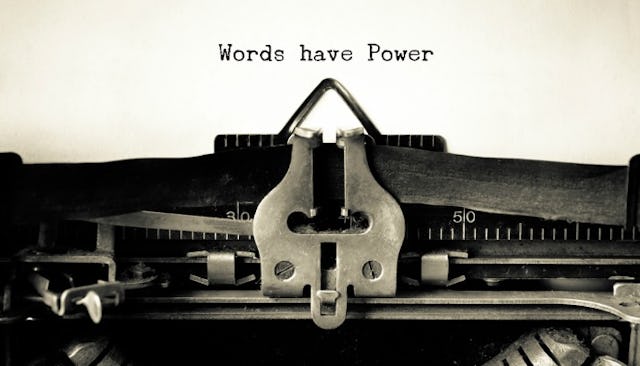Words Are Powerful, So Stop Invalidating Others With The 'Just Words' Excuse

“Calm down, everyone. It was just words.”
I’ve seen that phrase now a hundred times in response to the video of a candidate for the U.S. presidency bragging about being able to kiss women without invitation and “grab ‘em by the pussy” because he’s “famous.”
They were just words.
It’s true. They were “just words.” But that only lessens their impact if you believe that words don’t matter all that much.
The thing is, they do. Words are powerful. Words matter — a lot.
“Sticks and stones may break my bones, but words can never hurt me.” Kids have used that emotional self-defense against verbal bullies for generations. But thanks to science (and the testimony of anyone who has ever actually been bullied), we know it’s not true.
Verbal bullying from peers actually changes the brain in the same way that physical abuse does. Verbal bullying in real life and online is creating enough pain in kids — teens and children — that some of them have taken their own lives to escape it.
What is verbal bullying? Just words.
It’s not just peers whose words can do real damage. A report from Harvard University explains that parental verbal abuse can be just as damaging as physical or sexual abuse in the home.
Let me repeat that: Saying hurtful words to a child can do as much emotional and psychological damage as hurting their body.
In fact, according to the report, the impact of verbal abuse is worse than witnessing domestic violence in the home and worse than sexual abuse outside the home.
What is verbal abuse? Just words.
Have you ever read a book that changed your thinking? A book that made you cry? A book that scared you to death? (Thanks, Stephen King.) A book that rocked you to your core? Books can transport us to other worlds, make us experience deep emotions, help us understand abstract concepts, and influence our beliefs.
What are books? Just words.
Do you remember Martin Luther King, Jr.’s “I Have a Dream” speech? Of course you do. It’s one of the most important speeches in American history, one that galvanized a nation and opened people’s hearts to racial equality. Most of us can probably quote some of that speech. “I have a dream that my four little children will one day live in a nation where they will not be judged by the color of their skin, but by the content of their character.”
What is a speech? Just words.
How about Hitler’s speeches? Man, that guy could speak. Yes, he did heinous things as well — except if words don’t matter much, he didn’t really.
He gave rousing speeches that engendered national pride and created fear and prejudice against “other” groups. He created a propaganda machine that brainwashed the vast majority of a country into turning a blind eye to government-sponsored killings. He gave orders to have millions of people worked to death or put into gas chambers.
But get this: Hitler never personally killed anyone. Not a single soul.
So how is he responsible for the atrocity of the Holocaust? He used the power of his words. Just words.
Words matter. Words can help or hurt, heal, or harm. Words can change someone’s life, for better or for worse. They can break a heart, start a war, inspire a revolution, brainwash a following. Words create, shape, and change our reality, both individually and as a society.
So do not tell me that words are inconsequential. Don’t tell me that bragging about your ability to sexually assault women at will doesn’t contribute to rape culture and the objectification of women. Don’t tell me that laughing about how you “tried to fuck” a married woman shouldn’t have any bearing on my analysis of your character. Do not tell me that a recorded glimpse into your off-the-record life is just words.
There is no such thing as “just” words. There are words, period. Words with meaning. Words with power. Words that influence. Words that matter.